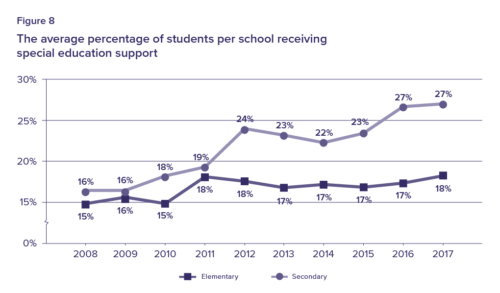Province increases funding for special education
Funding to support more specialists to identify students with special needs, reduce wait times
In its recent announcements of changes to Ontario’s Grants for Student Needs, the province promised $300 million in increases to special education funding over the next three years.

The new funding may help to address the growth in the percentage of students requiring special education support.
Addressing waiting lists for special education assessment
According to People for Education’s 2017 Annual Report on Ontario’s Publicly Funded Schools, there are at least 35,000 students waiting for special education assessments in Ontario. While most of these students are receiving some form of support, without an assessment it may be difficult to ensure that the support is targeted and appropriate. Principals have reported for a number of years that waiting lists are too long, and that school boards impose caps on the number of students schools can put on waiting lists.
Psychological assessment services are rationed essentially to the most needy one or two students a year. System level placements for our most needy students are rationed to an extent we are creating more problems during the wait time.
Elementary school, Hamilton-Wentworth DSB
We have children in crisis…wait lists are long, we do not have the services the children require to be successful at school. It is heartbreaking. The Ministry needs to re-evaluate this current funding model.
Elementary school, Limestone DSB
Over the next three years, the province will provide $125 Million targeted at providing appropriate professionals (psychologist, speech language pathologists etc.) to ensure students can be assessed quickly and at no cost. There are no details available yet as to how the new funding will be implemented.
Increases for other special education programs and services
An additional $170 million over the next three years will be provided to fund:
- multi-disciplinary special education teams for school boards to “build board capacity and and help teachers, education assistants, and other staff better understand and adapt to the unique needs of their students”
- increases in special education staff in schools (no details have been released, but presumably this would include staff such as special education teachers and educational assistants)
- increases to the Special Incidence Portion – a grant for students with very high needs (requiring more than two full-time staff). This funding is provided through claims submitted to the Ministry, and the maximum amount will be increased from $27,000 to $38,016.
Some board-by-board funding details are available in Appendix B of the funding announcement.
